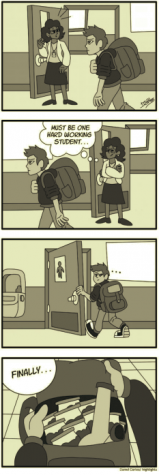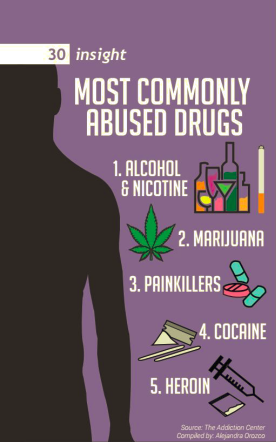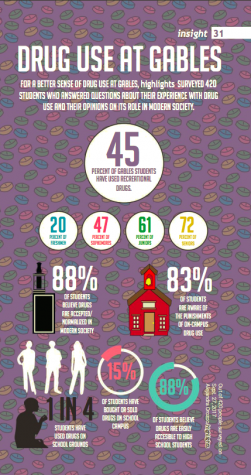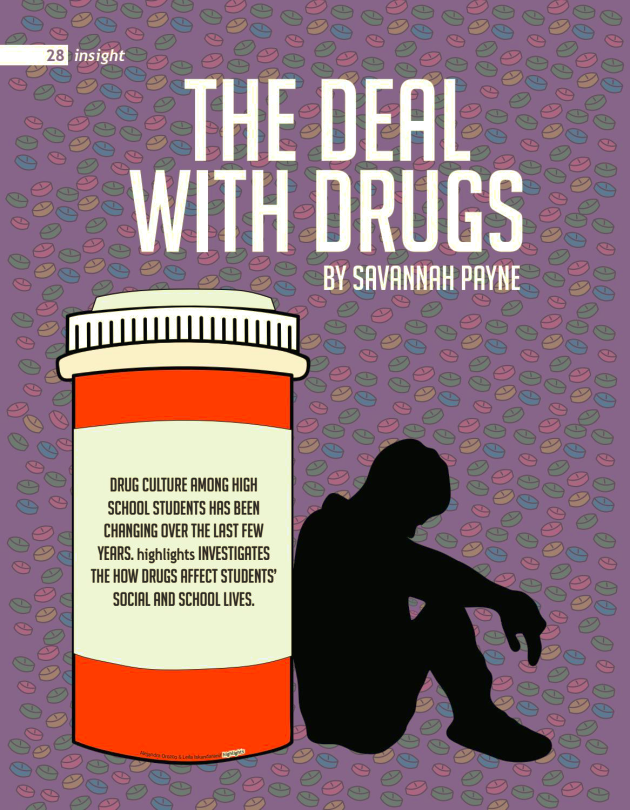Your donation will support the student journalists of Coral Gables Senior High School. Your contribution will help us cover our annual website hosting costs.
Issue 2: The Deal With Drugs
Drug culture among high school students has been changing over the last few years. highlights investigates how the drugs affect students' social and school lives.
Feb 12, 2018
Beginning with the decriminalization of marijuana in Oregon, Alaska and Maine in the 1970s, the United States has continued on a path toward fully legalizing marijuana. Medical marijuana was legalized in Florida in 2016, and various groups are continuing their efforts to push the recreational marijuana amendment on the state ballots. Increasing numbers of pro-marijuana legislation is representative of a larger, perhaps more contentious matter— society’s shifting drug culture, particularly in the high school environment.
Miami-Dade County Public Schools (MDCPS) currently has a zero-tolerance drug policy, meant to reduce school violence and promote a healthy learning environment. MDCPS regulates disciplinary actions by leveling each behavioral offense. Tobacco products and smoking devices fall under level two. Beginning at level three, the offenses intensify. Level three behaviors are classified as “offensive/harmful behaviors” and can result in punishments like suspensions, requests for expulsion or required counseling.

Among these behaviors is the “possession or use of alcohol, unauthorized over the-counter medications, drug paraphernalia, controlled substances and/or anything that alters mood or is used for mood altering,” according to the MDCPS Student Code of Conduct. Selling, buying or distributing drugs on campus is considered a level four offense— “dangerous or violent” behavior. To put the severity of how MDCPS views the infraction into perspective, dealing drugs is disciplined at the same level as motor vehicle and grand theft, sex offenses and hate crimes.
Depending on the type and amount of drugs found— either being used by or in possession of a student—penalties vary. In the event of an on-campus drug infraction, an on-campus resource officer, which every school in MDCPS is required to have by law, will work with school administrators to issue an appropriate punishment in accordance with MDCPS’s Student Code of Conduct. Punishments for drug related incidents can involve city or state police and range from suspensions to expulsion.
MDCPS has implemented “success centers” as a way to curb outdoor suspensions, that take students out of school for days or weeks at a time, unsupervised and unable to receive credit for missed schoolwork. There are currently 27 success centers in Miami-Dade County (MDC) that house students who have committed a level three offense, including any drug-related infraction. According to Assistant Principal Joseph Evans, students are able to keep up with schoolwork because the school sends the success centers everything the students will be missing. Students at success centers are also required to speak to counselors about their behavior and future consequences as a form of therapy. The idea behind success centers was to promote addressing a problem instead of sending a problem away for a short while with no attempt to fix it.
“I think [the success centers] have been effective. I will not tell you that it is a very fun place to go, yet it’s not a jail either,” Evans said. “[The success center] is a place to address and fix a problem.”
Though, the student opinion of success centers differs from that of the district. Instead of seeing it as helpful, one junior, Dante Hernandez, shared his opinion towards drug programs.

“Drug programs that try to stop kids from doing drugs are pointless. If kids want to use drugs, they’ll find a way… doesn’t matter how many times you tell them drugs are bad,” said junior Dante Hernandez.
While MDCPS has been enforcing success centers to toughen the county’s response to drug-related issues, some school administrators claim they have seen in-school drug related issues decrease.
According to Evans, the amount of referrals administered by the school by this time last year was double the number the school has given out so far this year. He attributed the decline to the awareness of consequences among the student body.
However, from the student’s perspective, this may not be the case. Out of sight of administration, the presence of recreational drugs within the student body is still prevalent. It is a possibility there is simply a decline of students being caught for drug offenses and not a decline of usage in the student body.
While the administration claims they have seen a decline of drug use in the last five years, a National Survey on American Attitudes on Substance Abuse found the amount of drug-infected high schools has increased in the last decade. The discrepancy can be attributed to a new drug culture among students.
Teenage drug culture has evolved due to increased accessibility and advances in technology, paving the way for new consumption methods and simplifying the concealing and distribution of drugs. Students can discretely consume drugs using edibles, which are foods infused with marijuana, vaporizers or vape pens. Vape pens can be filled with flavored water vapor, tobacco or tetrahydrocannabinol (THC) oils- the chemical ingredient in the Cannabis plant responsible for marijuana’s psychological effects, allowing students to administer drugs surreptitiously. These vape pens are absent of smell and allow for a higher concentration of THC than other smoking methods because they use marijuana oils and wax and, rather than turning solids to gas as other smoking methods do, vape pens turn liquids into vapor.
 JUULs, which are a version of electronic cigarettes, have been gaining popularity, as they are small, lightweight and can easily be transported and hidden. They are used with pods of varying flavors, each of which contain a cigarette pack’s worth of nicotine, according to the JUUL website. These new technologies allow for drug usage and smoking, on and off school grounds, to go unnoticed by school administration.
JUULs, which are a version of electronic cigarettes, have been gaining popularity, as they are small, lightweight and can easily be transported and hidden. They are used with pods of varying flavors, each of which contain a cigarette pack’s worth of nicotine, according to the JUUL website. These new technologies allow for drug usage and smoking, on and off school grounds, to go unnoticed by school administration.
Evidently, while the administration might not be catching students possessing or using drugs, there is still the possibility that drugs are present.
“[Drug culture] is forever changing, because there are always new things coming out, it’s the gummies, and lollipops and the candies,” Assistant Principal Aida Diaz said.
The convenience of buying and using drugs evidently contributes to a growing commonality of drug usage among high school students— in fact, in a survey conducted by the National Survey of American Attitudes on Substance Abuse, almost half of high school students surveyed across the country (44 percent) said they know of a student who sells drugs at their school. The survey also found that over 60 percent of high school students across the country reported that “their high schools are drug infected.”
“Students think that marijuana, because it has been legalized in some states, it’s okay… and it’s not okay,” Diaz said.
As a result of the increase of drugs in high schools in the last decade, the school campus can be seen as a drug outlet itself. Students are susceptible to the presence of drugs in regular social life, sometimes both in and out of school. Students are being exposed to this lifestyle and as a result, this type of culture is being perceived as normal. This is the trend that begins to influence society’s attitude towards drugs.
Drugs in high school are becoming an increasing part of the developmental environment that students experience every day, and it is a component of their teenage culture. As a result of evolving culture and technology, drugs are becoming more accessible, widespread and normalized within the student body.
While the administration has seen a decline in drug cases on campus, this could be attributed to the changing culture affecting teens and not a drop in drug usage. The presence of drugs in high school is prevalent everyday among students in and out of school.
